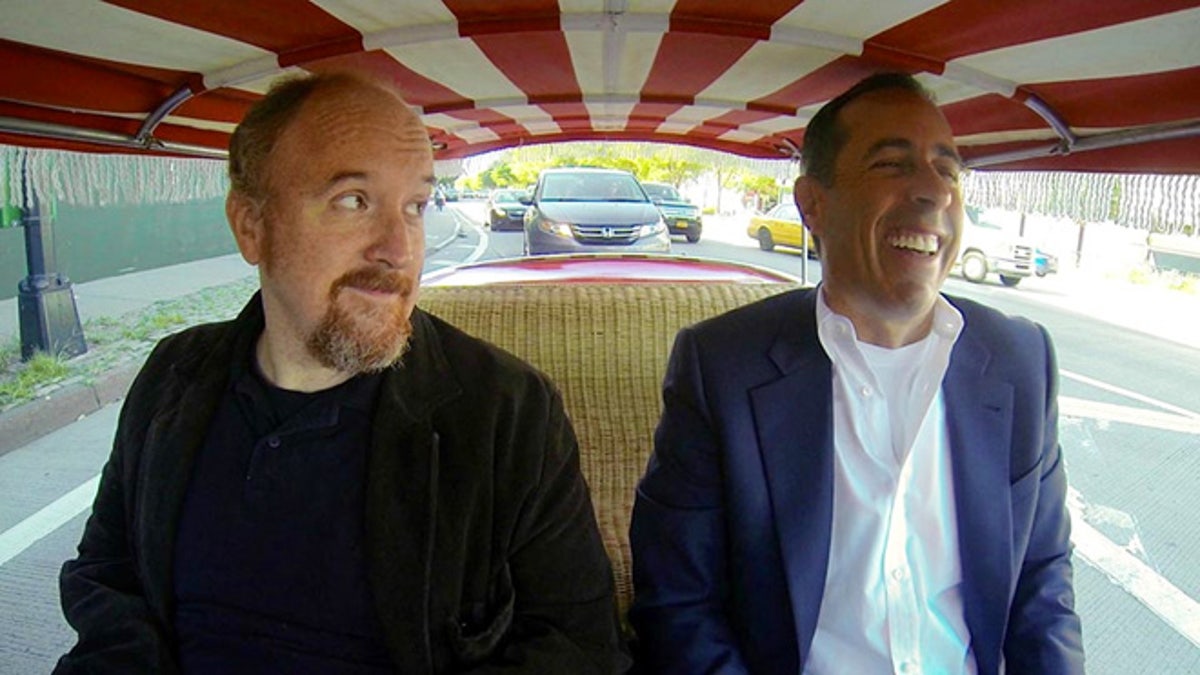
(AP)
Jerry Seinfeld loves cars. He's fond of coffee. And, of course, he's a comedian who loves to talk comedy.
But the inspiration for his online talk show, "Comedians in Cars Getting Coffee" (wherein he and a fellow comedian crack wise while powered by a car and caffeine), was inspired by an episode of his eponymous 1990s sitcom.
In that memorable episode, Jerry's sad-sack pal, George, decided success might await him if he lived his failed life in the opposite manner.
"That," recalls Seinfeld in a recent interview, "gave me the idea to create a talk show that was the opposite of the typical show.
"With a typical talk show," he explains, "you have to go to a studio. You have to tell them in advance what you're going to talk about. You have to dress up. You have to put on makeup. It's very, very organized.
"I thought, maybe there's a different way than being stuck on a couch: Outside and moving is the opposite of inside and still.
"That," he sums up, "is where it began."
"Comedians in Cars Getting Coffee" launched on the Crackle digital network in 2012, and its third season hits the road Thursday with Seinfeld joining Louis C.K. for a cup of joe after a zany ride on a clown-car-scale 1959 Fiat Jolly.
"I pick you up at your house and we literally go out for a cup of coffee." Future ride-alongs include Patton Oswalt, Howard Stern, Tina Fey, Todd Barry and Jay Leno.
"I wanted to make a show that people would like to be on, instead of groaning and going, 'Yeah, all right, I'll do it,'" says Seinfeld in his office in Manhattan's famed Brill Building, where soon he will begin another editing session to whittle the Leno episode to a tight 18 or 20 minutes from the two or three hours of recorded chitchat.
Each show is meticulously crafted. But that's no surprise, considering how, at age 59 with nothing left to prove, Seinfeld continues to revise and refine his stand-up act. Here, too, Seinfeld is a stickler for detail, as when he huddles with an editor a few minutes later to tweak the music accompanying a shot of the car (a 1949 Porsche 356/2) he and Leno will share.
"Do you feel like that music is a little bit of a rough transition?" he muses. "It's a little abrupt. But you know the second phrase of that track is a little more gentle. Maybe we could start there, you know what I mean?"
Even so, the flavor of each episode is insistently no-frills, candid and off-the-cuff.
Seinfeld says he never prepares for a taping.
"Things just occur to me. Like asking Howard Stern to tell me how his life ends, what he's doing in that last moment. It just occurred to me as we were driving. He seemed like a guy who's really afraid of death. So I wanted to ask him about it."
As for Oswalt, "he seemed very comic-book geeky, so I asked him, 'What's your favorite superhero?' And he froze. That was like the worst thing I could ask him. He couldn't commit to one comic book superhero being his favorite!"
Needless to say, Seinfeld mostly focuses on comedy with each guest. Welcome to his world.
"That's what I NORMALLY talk about during the day," he says, looking very Jerry at his desk clad in jeans, a gray sweater with a rakish black scarf at his throat and a pair of Nike Shox. "At least 50 percent of the waking life of every comedian is gossiping and analyzing with other comedians about comedy. Comedy is a very mysterious profession, so we're always trying to figure it out.
"This show is a little bit of a valentine to a certain subset of humanity," he goes on, winding up for a Seinfeld-esque riff that, even on the fly with mixed metaphors and bumpy syntax, spins out humorously. "I wanted to put a few comedians into this one petri dish — that's what this show is — 'cause you got to get them in the wild. If you're going to study a species, you got to study them in the wild, otherwise the experiment is tainted! The evidence is tainted!"
In the untainted back-and-forth that results on his show, Seinfeld proves to be an excellent audience, clearly enjoying each guest's bons mots as much as he enjoys delivering his own.
"I got really excited about the Leno episode," he says, "with me being his friend all these years, and now having this opportunity to show the old comedy-crazy Jay. So many people think of him as a talk-show host. This captures him as a comedian."
Fine, but how competitive does Seinfeld feel in the company of another comedian?
"Zero," he declares, and flashes a quizzical smile: "I haven't done well enough?! But even if I hadn't," he adds, growing serious, "no, I do not have that gene."
And yet, as you watch Seinfeld matching wits with a guest, it's not hard to imagine he's on high alert for any fresh idea embedded in the banter that, with just the right tweaking, could end up in his act.
You bet, Seinfeld nods.
"That's my whole life," he says. "That's every single second of my life."



















